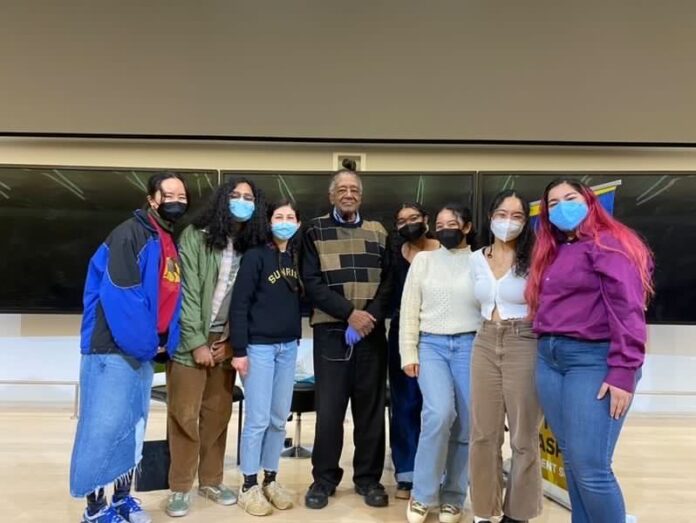The historic civil rights leader continues his legacy with words of inspiration for Davis students
By DANIELA DULA MEJIA — features@theaggie.org
“It [was] absolutely surreal,” said Dionica Bell, the director of the African American Retention Initiative and the Center for African Diaspora Student Success (CADSS). “How often do people get to say that the things they grew up learning about and the moments that changed the trajectory of our stories [are] sitting across from you.”
On Thursday, Feb. 23, 86-year-old co-founder of the Black Panther Party (BPP) Bobby Seale spoke to a crowd in California Hall. The BPP was an international group that was originally formed in 1966 in Oakland, California. Seale and Huey P. Newton, the other co-founder, worked to protect Black citizens from police brutality and to create programs such as the BPP’s free breakfast program that is still in place today.
Seale was invited to speak as the keynote speaker as part of this year’s two-day “BFM Signature Event.” Attendees came from as far as Fresno, California, to listen to him talk.
Black Futures Month is a campus-wide celebration that is held each year for the entire month of February. According to the UC Davis Diversity, Equity and Inclusion website, “Black Futures Month is a shared vision of the trajectory for Black life on the UC Davis campus [and] beyond. During the month of February, we are committed to remembering, celebrating [and] learning from Black History.”
Each week, different campus centers held community events. The Women’s Resources and Research Center (WRRC) hosted Black Femme Magic Week from Feb. 13 to 17. The LGBTQIA Resource Center and the Cross Cultural Center (CCC) also hosted events including “Reimagining Black Love: Film Screening & Artist Talk.” CADSS was in charge of programming for the final week.
Bell said she specifically wanted Seale to come because she hoped it would “reconnect [students] to today’s social justice movement” after the COVID-19 pandemic put a pause on many students’ lives. Bell said she wanted students to feel energized and also remind students about how capable they are of changing the world at any age.
“I thought what better way than to find a piece of our history around social justice during Black Futures Month,” Bell said.
When Seale and Newton started the BPP, they were both students at Merritt College. Seale said during the event that he also started a Black History reading group after college which he hosted with about 12 others at the time.
“When the Black Panthers started, they were all in their 20s,” Bell said. “MLK, Bobby and Huey were all right on the other side of college. I thought if they could achieve that at such a young age, how inspiring would it be for our students right now.”
Seale is still an active member in his community in the Bay Area and announced future plans to work on housing inequity in the East Bay, as well as his involvement with youth programs and grant writing. Bell also reminds us that if “the Black Panther co-founder is still working, the rest of us can not rest on our morals.”
After the event, students in California Hall reflected on the words and the impact Seale’s legacy continues to have on them. Sriram Srinivas, a second-year plant sciences major, said they believe the BPP is an important part of history.
“So much of our liberation comes from the work and conception that the Black Panther Party created and the work they did,” Srinivas said. “I’m really grateful, and I want to learn more about the work they did, so I can see what I can do now.”
Another student, second-year American studies major Emi Morrujo, said she, as a Chicana student, has a personal connection to the Black Panthers and Bobby Seale.
“A lot of the Chicano movement brought their points and drew from the Black Panther Party,” Morrujo said. “So I feel like a lot of the liberation that I get today in society comes from the Black Panther Party.”
Having Seale come to campus and speak was a historic moment that will be solidified in the minds of many students for years to come. As Seale mentioned at the event, there is still more work to be done. Seale said in his speech that students should remember to “love, respect and care for [their] community,” as well as promote change.
“A big part of my life is always trying to reconnect with that era, that generation, to learn from them,” Kwame Hargrove, a first-year history major, said. “Both their successes and failures and how I apply my own consciousness of what I think is right or wrong, with political action, social change and things like that.”
It is important to remember that everyone has an obligation to stand up against oppressive forces, according to Bell.
“Folks [should] keep in mind there is work to be done and that we need accomplices to get that work done,” Bell said. “It is not on the Black students to fix the institution. It is not on the Black faculty to fix the institution and the Black staff and administrators, although all of them are working. It is the work of the institution and its entirety — the students, the faculty and the administration.”
Written by: Daniela Dula Mejia — features@theaggie.org





